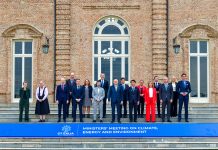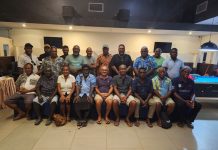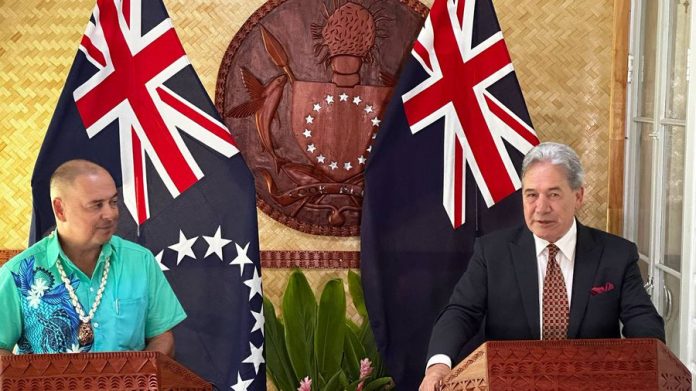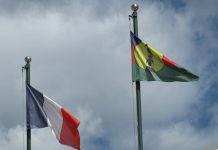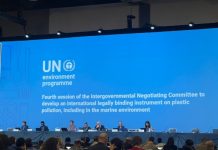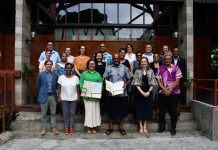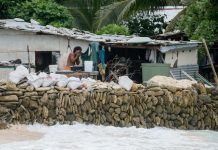By Sam Sachdeva
With a common citizenship and currency, closely related native languages, and formal relations dating back over 120 years, there is much that binds the Cook Islands and New Zealand closely together.
Yet in recent years, the small Pacific nation has increasingly sought to move out from the shadow of the Realm of New Zealand.
Sporadic talk about securing fully sovereign status may not have come to fruition, but the United States’ decision to initiate direct diplomatic relations with the Cook Islands (as well as Niue) last year has served as a boon to those in the country hoping to benefit from bilateral ties with partners other than New Zealand.
read more
While Aotearoa maintains a specific obligation to assist with the Cook Islands’ defence and security if asked, the country is looking to branch out in that area too.
Marking 30 years of diplomatic relations between his nation and Australia last month, Cook Islands prime minister Mark Brown announced his desire to pursue a new defence and security agreement involving not just New Zealand, but our trans-Tasman neighbours as well.
Speaking at a press conference this week after his meeting with Peters, Brown indicated the proposal was primarily about updating existing Australian support to the Cook Islands in areas like transnational crime and cybersecurity threats.
“Linking that with New Zealand’s traditional support for our security and defence arrangements is something that I think would be worth our three countries sitting down and having a chat about what that would look like.”
If the prime minister’s plan does come to fruition, it would be just the latest in a series of pacts signed across the Pacific in recent years – raising fears in some quarters about the potential militarisation of the region.
In early 2022, news broke of a security deal between China and the Solomon Islands that would allow the superpower’s vessels to carry out “logistical replenishment” in the Solomons – a potential precursor to a permanent base with military applications, according to some experts.
Since then, Western nations have been rushing to head off the threat of further Chinese security pacts. The United States has inked deals with Papua New Guinea and the Marshall Islands – the former giving the American military “unimpeded access” to the island nation’s bases – while Australia has signed defence-minded agreements with Papua New Guinea, Tuvalu and Vanuatu (although the lattermost is in doubt after the country’s new prime minister indicated last September he wished to rewrite the deal).
New Zealand is no exception, having signed a new deal with Fiji in mid-2023 to strengthen military training and maritime security.
Peters seemed reluctant to make too much of the trilateral concept for the time being, his remarks to media indicating the Government may have received little advance warning of the Cook Islands’ aspirations.
“We’re talking about something new that has been floated with Richard Marles, the deputy prime minister of Australia, and [Australian foreign minister] Penny Wong well before we got to hear it right here, right now, and so both Shane Reti and myself and our Cabinet will have to consider that going forward, on the best advice of our foreign affairs team.”
The foreign minister was also cagey when it came to the topic of the proliferation of security pacts throughout the Pacific – yet it was just about possible to discern a veiled critique of China’s diplomatic endeavours in the region, albeit without ever directly naming the country.
“The approach that we would like to follow is, let’s find out what is actually being said, what has been promised to the rest of the world, and hold those people to the promises they made…
“If you say, ‘I’m here for a peaceful purpose, but I’ve got a whole lot of things I want to do militarily’, you’ve kind of got to be called out, I would expect, wouldn’t you?”
Then there is Aukus, the polarising trilateral security pact with a bill many magnitudes greater than anything that could possibly be agreed between the Cook Islands, New Zealand and Australia.
While New Zealand contemplates whether to sign up to the second pillar of the deal, focused on emerging technologies, it is the plans to provide Australia with nuclear-powered submarines that have caused the most unease in the Pacific – at least in part due to the destructive legacy of nuclear testing in the region.
Although some Pacific activists, scholars and politicians have criticised the plan to spend hundreds of billions of dollars on military hardware rather than tackling climate change, reaction to the prospect of New Zealand taking up a role in the less contentious aspects of Aukus has been muted so far on Peters’ trip.
Tonga’s acting prime minister Samiuela Vaipulu dodged a question about his country’s views, saying simply that “we don’t interfere with what other countries do”, while Brown’s initial concern about the deal in 2023 subsided after he received “assurances” from American officials regarding the nuclear dimension.
But on Thursday, Brown reiterated his belief that the time was right for a review of the Treaty of Rarotonga – the 1985 pact that established a ban on the use, testing and possession of nuclear weapons within the South Pacific – taking into account issues like the Aukus pact, as well as the discharge of contaminated wastewater from Japan’s Fukushima nuclear plant into the Pacific.
Marco de Jong, a Pacific historian at the Auckland University of Technology, told Newsroom the potential revitalisation of the Treaty was “timely as the region faces a new nuclearism and works to distance itself from superpower rivalry”.
“To strengthen and update Rarotonga for today, Pacific nations might review its language, work to have it universally adopted amongst Pacific nations, or have its existing provisions better enforced,” de Jong said, noting that some nations had “downplayed” its application in relation to Aukus and Fukushima despite going against the spirit of the treaty.
Peters has bridled whenever the issue of Aukus has been brought up by New Zealand journalists on his current trip – but just as new security deals show no signs of diminishing, the topic is unlikely to go away any time soon.
SOURCE: NEWSROOM/PACNEWS




